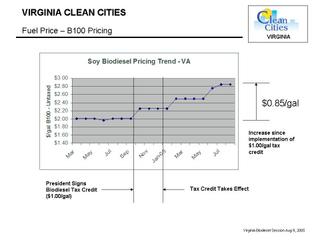2005 NC Alt Fuels Legislation
Link2005 NC Legislation Focuses on Transportation Fuel Diversity, Encourages Energy Independence
North Carolina will benefit by legislative actions undertaken by the General Assembly to support renewable fuels and advanced technology vehicles, reduce harmful transportation related pollutants and diversify fuel supplies. The U.S. transportation sector is 97% reliant on petroleum and transportation emissions are a significant contributor to the State’s air quality problems.
Section 19.5, a provision in North Carolina’s 2005 state budget, requires state fleets to achieve a 20% reduction or displacement of current petroleum use by 2010. This provision will spur the use of alternative fuels such as biodiesel and ethanol; non-petroleum based lubricants, hybrid electrics and other fuel efficient vehicles. All state agencies, universities and community colleges that operate a fleet of over 10 state owned motor vehicles are required to comply with the new requirement and report annually by September 1st to the State Energy Office, Department of Administration.
S1149- an Energy Credit Banking and Selling Program Fund Bill- enables the State Energy Office to generate funds for expanded use of alternative fuels and other projects approved by the Energy Policy Council through the sale of excess Energy Policy Act credits. The Energy Policy Act (EPAct) of 1992 requires the state to purchase alternative fuel vehicles. Credits earned by exceeding EPAct requirements may be sold to other U.S. entities and carry a monetary value between $750-$1,200. The state has earned excess credits through use of B20 (a blend of 20% biodiesel 80% petroleum diesel) by the NC Department of Transportation and E85(a blend of 85% ethanol, 15% gasoline) by the State Motor Fleet Management. This bill also expands and extends through 2011 tax credits for renewable energy property and equipment. Eligible technologies for the 35% tax credit include biodiesel and ethanol production, anaerobic biogas, wind and solar energy.
H 1336 bans methyl tertiary butyl ether (MTBE) in North Carolina by 2008. MTBE is a petroleum derivative added by refiners as an oxygenate for gasoline. It is a ground water containment and classified by the U.S. EPA as a probable carcinogen. Ethanol is a non toxic, renewable replacement for MTBE. North Carolina is the first state in the SE to ban MTBE. H1336 requires the Secretary of the NC Department of Environment and Natural Resources and the NC Commissioner of Agriculture to engage other states- Alabama, Gerogia, Kentucky, Mississippi, South Carolina, Tennessee and Virginia- to study the feasibility of a coordinated phase out.
Three other bills supported by the Triangle Clean Cities coalition and other alternative fuel advocates await action by the General Assembly. S1150/H1296 – Renewable Fuels Motor Fuels Tax Exemption- removes the state motor fuels tax, currently .27 per gallon, in proportion to the amount of biodiesel or ethanol blended into petroleum fuel. S1038/H1595- Mobile Source Emission Reduction Program- generates revenue to provide grants for alternative fuel related projects through a vehicle surcharge added to annual motor vehicle registration fees that’s based on a vehicle’s fuel economy and emissions ratings. S1015/H1766 provides a tax credit to NC businesses and individuals that purchase hybrid electric and alternative fuel vehicles.
See Link line under title for-
Bill look up at : http://www.ncga.state.nc.us/homePage.pl
# # # # #
For more information :
Anne Tazewell
NC Solar Center
919.513.7831
anne_tazewell@ncsu.edu
www.ncsc.ncsu.edu

